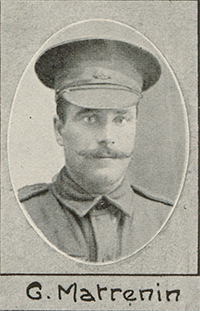Gregory Matrenin
| Russian spelling | Григорий Михайлович Матренин |
|---|---|
| Born | 1888 |
| Place | Krasnoe, Simbirsk (Ulianovsk), Russia |
| Ethnic origin | Russian |
| Religion | Russian Orthodox |
| Father | Mikhail Alekseevich Matrenin |
| Mother | Anna |
| Family | Wife Mary Matrenin and children Nyura (Anna) and Mikhail stayed in Krasnoe in Russia; |
| Contacts | Gregory Matrenin, Nicholas Silantiff and Michael Wolkoff arrived, enlisted and served together |
| Arrived at Australia |
from Yokohama, Japan on 27.03.1914 per Kumano Maru disembarked at Brisbane |
| Residence before enlistment | Guluguba, Miles, Qld |
| Occupation | 1915 labourer, 1949 wool rug maker |
| Naturalisation | Served as Russian subject; 1949 naturalised in the UK |
| Residence after the war | 1918-1921 stayed at Dunstan's Hostel, Regents Park, London; 1922 Alpington, Norfolk, 1951 St Dunstan's, Brighton, UK |
| Died | 6.02.1962, Brighton, Sussex, England |
Service #1
| Service number | 4166 |
|---|---|
| Enlisted | 21.09.1915 |
| Place of enlistment | Toowoomba, Qld |
| Unit | 26th Battalion |
| Rank | Private |
| Place | Western Front, 1916-1917; England 1917-1920 |
| Casualties | WIA 1917 (multiple gun shot wounds, became blind) |
| Discharged | 7.09.1920 MU, in England |
Materials
Digitised service records (NAA)
Digitised Embarkation roll entry (AWM)
Australian Imperial Force Headquarters (London) Administrative Registry (AWM)
Application for free transportation to Australia for himself, wife and children (NAA)
Naturalisation in the UK (National Archives, UK)
Blog article
Publications
The King and Australian St. Dunstaners. - St. Dunstan's Review, September, 1938, p. 2.
Gregory Matrenin. - St. Dunstan's Review, February, 1962, p. 10.
Private Gregory Matrenin. - St. Dunstan's Review, February, 1962, p. 11.
From Russian Anzacs in Australian History:
There were also the three friends, Gregory Matrenin, Nicholas Silantiff and Michael Wolkoff, from the remote village of Krasnoe along the River Volga, about 200 km from the nearest city in Simbirsk province. These men left wives and children at home and came on the Kumano Maru to Australia -- probably to earn some money -- just a few months before the outbreak of the First World War. The three joined up together and served in the 26th (Queensland) Battalion of the AIF. Theirs was a story touched by tragedy [...].
Gregory Matrenin, one of the three from Krasnoe village whose lives we have followed through the war, was demobilised in London [...]. Once he'd recovered from his wounds, sustained at Bullecourt in May 1917 he was placed in St Dunstan's hostel for blind soldiers, where he received training in poultry farming and willow basket-making. He applied for his discharge in May 1920, stating his intention was to try to find his wife and two children in Russia, 'who have not been heard of for some time'. I could not manage to find out whether he succeeded in crossing a Russia gripped in the turmoil of civil war, whether he had reached Krasnoe and was able to tell the families of Silantiff and Wolkoff, his friends, about their fate.
Gallery

Gregory Matrenin
Queenslander Pictorial, supplement to The Queenslander, 29 April 1916, p. 23
 Russian Anzacs
Russian Anzacs